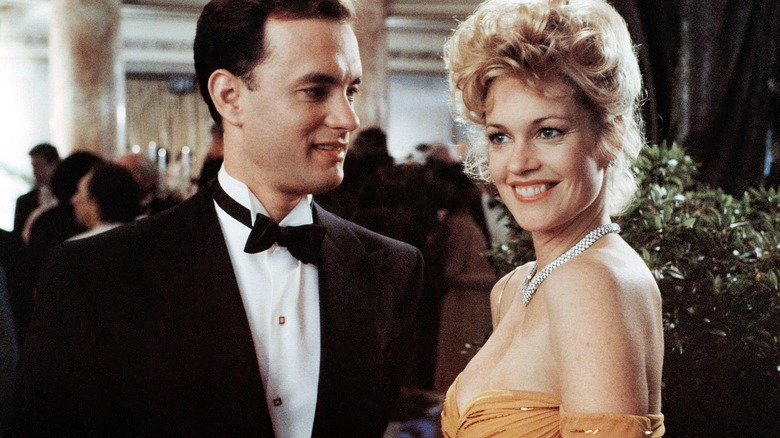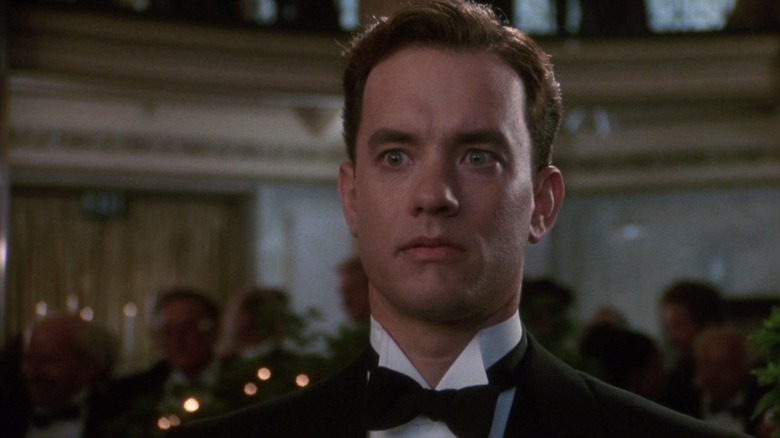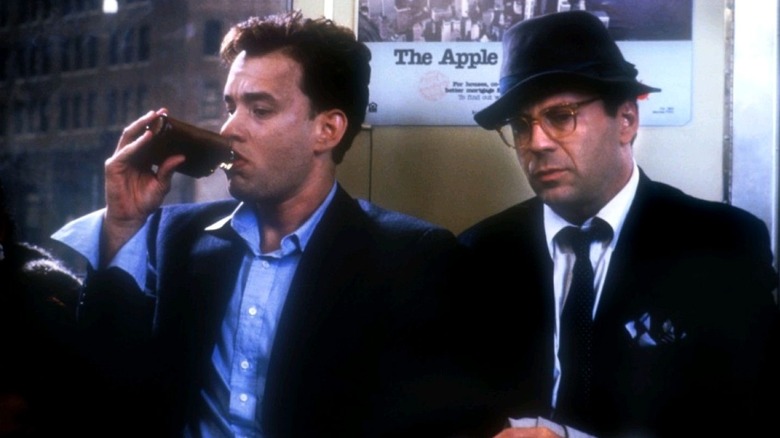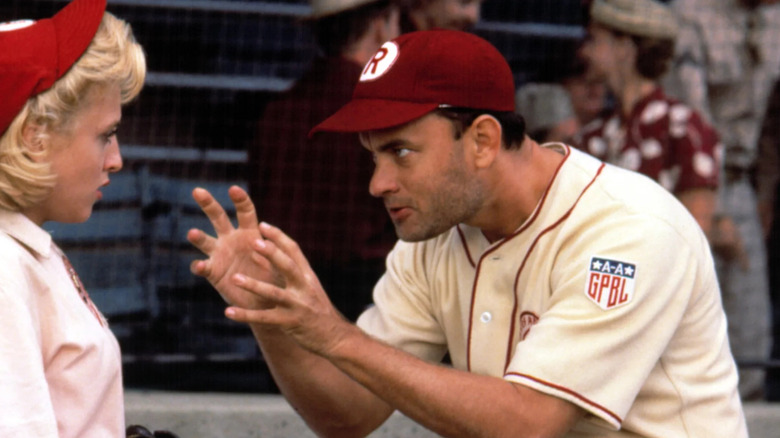Tom Hanks Thinks This Is The Crappiest Movie He's Ever Made
In her 1991 book "The Devil's Candy: The Anatomy of a Hollywood Fiasco" (revised in 2002), author and critic Julie Salamon lays out, in excruciating detail, everything that seems to have gone wrong on the set of Brian De Palma's overwhelmingly enormous 1990 turkey "The Bonfire of the Vanities."
Based on the book by Tom Wolfe, "Vanities" was about a sleazy, married Wall Street bond trader named Sherman McCoy (Tom Hanks) who is having an affair with a younger woman (Melanie Griffith). It takes place in a world where everyone is wealthy, white, and morally bankrupt. When Sherman's mistress, in a moment of racial panic, runs over a Black youth in Sherman's car, Sherman must cover up the crime and accept no blame; he accepts blame for very little in his life, the general milieu of the once-ascendant yuppie class. Bruce Willis plays a hotshot, alcoholic journalist assigned to the case. Kim Cattrall plays Sherman's wife, and Morgan Freeman, Saul Rubinek, and John Hancock all appear. Kirsten Dunst, then only 7, plays Hanks' daughter.
"The Bonfire of the Vanities" attempts to make broad comments on injustice, racism, and the hazy morals of America's wealthy class, but too often descends into bland melodrama, often unsure if we're meant to sympathize with Sherman or see him as emblematic of the era's pervasive turpitude.
"Vanities" was a massive bomb upon its release, making only $15 million on an extravagant, talent-forward budget of $47 million. Critics were also not kind, and the film currently holds a mere 16% approval rating on Rotten Tomatoes. Someone else who is distinctly embarrassed to have taken part is Hanks himself who, in an interview with Oprah Winfrey, called it the crappiest movie he's ever made.
Manufacturing a core connection
Those old enough to remember 1990 will recall just how high-profile "Bonfire" was. Hanks was a rising star having come off of a string of comedy hits like "Dragnet," "Big," and "Turner & Hooch." Bruce Willis had ascended to box office gold status with "Die Hard," "Die Hard 2," and "Look Who's Talking," and had just ended a successful run on the hot TV series "Moonlighting." De Palma was already on his 20th film, having broken into Hollywood prestige fare with films like "The Untouchables" and "Casualties of War." Additionally, Wolfe's book (first published in 1987) had caused more than a minor stir. All eyes were on this project.
Although Hanks had reached a level of success that might come with a certain amount of discernment when it comes to future projects, Hanks was still of the mindset that he had to say "yes" more often than "no." When Winfrey asked Hanks if he wishes he had said no, Hanks was frank:
"Only because it's one of the crappiest movies ever made! And yet if I hadn't gone through that experience, I would have lost out on something valuable. That movie was a fascinating enterprise from the word go. It was bigger than life, and for some reason it had a huge amount of attention on it. I can go to Germany, even now, and people will say, 'How come you don't make good, gritty movies like "The Bonfire of the Vanities" anymore?' They have no concept of what it meant to be an American and have that movie enter the national consciousness. 'Bonfire' taught me that I couldn't manufacture a core connection."
Hanks, in other words, forced himself to connect with a role he had no connection to.
Miscasting
A big issue many critics took with "Bonfire" was its casting, and many agreed that Hanks was the wrong choice to play Sherman McCoy. Gene Siskel wrote as much in his review at the Chicago Tribune. Hanks related to Oprah that fans of Wolfe's novel would be bold enough to stop him on the street and — accusatorily — declare him to be incorrect for the role. Perhaps Hanks is too naturally sympathetic to play such a sleazeball character. With Winfrey, Hanks recalls the chip he had on his shoulder when confronted, driving him to entrench and continue to explore something he simply didn't get a handle on.
"[The lesson] came along at the right time. When I was playing Sherman McCoy, people stopped me on the street to say, 'You're not Sherman McCoy.' I was like, 'Oh, yeah?' I was going contrary to everything about the character and even the screenplay, but I kept telling myself, No, no, no — there's a way I can get into this."
And why, Winfrey asks, did he take the role in the first place? "Because I was asked to," he said. Also that "back then, that was still a big deal. I thought I could bulls*** my way through."
'By whether I still have a passion for my work'
But bulls*** he could not. "Bonfire" tanked and remains one of the more notorious bombs of its time. Hanks now accepts projects if he can become excited about them. When Winfrey asked Hanks how he defines success, he answered merely, "By whether I still have a passion for my work."
Sure enough, following "Bonfire," Hanks began making some of the more notable films of his career with "A League of Their Own," "Sleepless in Seattle," and the Oscar-winning one-two punch of "Philadelphia" and "Forrest Gump." Hanks' status as America's Movie Star was pretty much cemented.
Brave readers can watch "The Bonfire of the Vanities" for free on Tubi.



